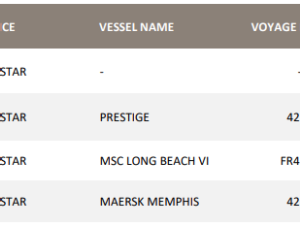Cool Logistics tackles reefer rates and box rot
posted by AJOT | Jul 21 2017 at 12:46 PM | Liner Shipping
If a shipping company tries to justify a general reefer rate increase by promising 'to provide (its) customers with reliable and efficient services' does it not open itself to justified criticism that its service prior to the increase may have been below standard?
This type of phraseology picked at random from one of the recent GRI or GRR announcements put out by one of the three leading shipping companies providing reefer services, should raise concern.
If more customers were to challenge 'double standards' of that sort on a concerted basis, shipping companies might be challenged more effectively. One option would be for individual companies to speak up or exert pressure on shipper bodies to address this kind of language.
The sad truth is that too many cargo owners still consider challenging shipping companies as too risky, fearing reprisals by the carriers if they were to criticise what many of them consider to be a minefield. One such danger is the fear amongst individual shippers that they will not be able to book a reefer box as and when they need it or that they end up receiving boxes that are either 'beyond repair' or otherwise unsuitable for transporting perishable produce. Another problem is that too many shippers trust 'the experts' working for both carriers and freight forwarders to have the customers' best interests at heart.
Meanwhile there are others who fail to understand that carrying potentially corrosive substances in reefer containers can lead to potentially very costly damage to reefer containers, with both shippers and carriers to blame. Who would have thought that grapes and bits of leftover squid inside containers could lead to the forcible removal of container floors costing between 5000 and 7000 USD or up to 1000 USD for a corroded evaporator coil?
Obtaining greater rate transparency should be the right of any cargo owner. Stripping the language of misleading statements including any hidden surcharges might be a start. By the same token prevailing lethargy amongst many shippers to simply accept poor service or unexplained delays should be seen as a warning that the smallest disruption can cause havoc in the perishable supply chain.
These issues will be addressed at Cool Logistics Global 25-27 September in Algeciras by Robert Sappio, CEO of SeaCube; Andy Connell of A-bar-C Services; Mitchell Brooke, Logistics Development Manager of the Citrus Growers Association of Southern Africa; and Mark Bennett, a Consultant
with expertise in many aspects of container ownership and management.
9th Cool Logistics Global
25 - 27 September 2017
Guadacorte Park Hotel
Algeciras, Spain
www.coollogisticsglobal.com










